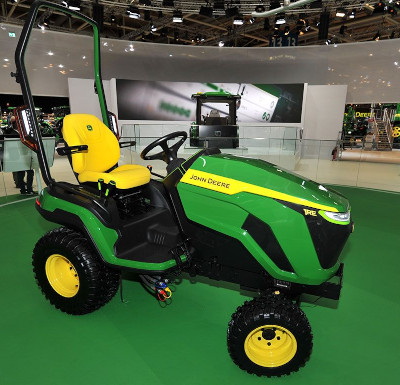John Deere Showcases Futuristic Autonomous Electric Tractor
April 21, 2021
The new electric tractor prototype is cab-less and features a powerful 680HP electric drive.

John Deere is among many off-highway equipment manufacturers working on electrification solutions and autonomous driving. The company showcased many futuristic electric prototypes at Agritechnica, Germany's largest indoor farm show, in November 2019.
The most recent electric tractor prototype released to the public is dramatically different than prior prototypes. It is much smaller and has rubber tracks connected via an articulation point to a set of discs. The electric tractor can also be equipped with wheels instead of tracks. The electric tractor does not have a rear axle or cab, and the implement is carried on the rear wheels for transport.
The electric tractor is said to produce a minimum output of 500 kilowatts (equivalent to 680 horsepower), which puts it up there with the largest high horsepower tractors today. John Deere has not yet provided more technical details regarding battery type, price, or release date.
The technology and design are truly impressive. Farm equipment is set to see a major transformation over the coming years as manufacturers electrify their offerings. The tractor is able to use hands-free AutoTrac satellite guidance to steer the machine from a remote area.
Electric drives are completely different from traditional internal combustion engines we are accustomed to today. Electric motors have far fewer moving parts and pieces subject to wear and tear — as a result, parts and service costs related to the drive are much lower (see our post about diesel engines).
Kubota is also working on an AI-controlled electric tractor. Similar to the race toward electric vehicles in the automotive space, it seems inevitable that off-highway vehicles will follow the same electrification and autonomous driving path. Electrification requires large upfront investments by manufacturers to retool factories. Tesla has hinted that long-term EV manufacturing costs might actually be lower than traditional internal combustion diesel engines after the initial retooling costs are complete.
Electric motors have very high torque at low speeds, and they are more efficient, more reliable and lighter. Electrical drives will also eliminate the need for many hydraulics in tractors.
John Deere 1RE Series Compact Utility Electric Tractor

John Deere also showcased a prototype of the 1RE Series Compact Utility Tractor. It features high PTO power, zero emissions, and it can mow approximately 2.5 acres on a single charge. The compact utility tractor is much quieter than its diesel cousins, and it will have much lower maintenance costs. The 1RE Series is expected to take about 4.5 hours to fully recharge.
John Deere Autonomous Drone Sprayer

Other futuristic prototypes included an autonomous drone sprayer system capable of scanning for weeds and spraying them. The drone base station can house multiple drones that take off and land back at the base station for recharging and refueling. Each drone is able to fly for about 30 minutes before requiring a recharge. The system will enable precise application of pesticides, which will improve cost savings and reduce overall pesticide usage. Also, since the drones spray from the air, they are able to operate regardless of ground conditions.
John Deere Autonomous Sprayer

Similar to the electric tractor prototype, John Deere also showed a cab-less autonomous sprayer prototype. The machine is much lighter than a traditional self-propelled sprayer, and it features a 150-gallon tank. Given its light-weight, it is able to operate in fields after rain without causing any soil compaction. The ground clearance is about 6 feet, which makes it very versatile.
An Encouraging Future
John Deere is investing heavily in the future of farm equipment. The machinery of coming decades will likely look and operate dramatically different than what we are accustomed to today. Progress and productivity come from embracing change and technology.
Note: All images are from Deere.com
Resources
Find Nearby John Deere Dealers
John Deere Electric Tractor



